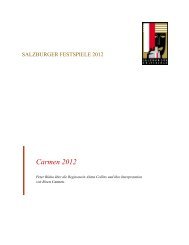Programmfolder Pfingstfestspiele 2013 - Salzburger Festspiele
Programmfolder Pfingstfestspiele 2013 - Salzburger Festspiele
Programmfolder Pfingstfestspiele 2013 - Salzburger Festspiele
Sie wollen auch ein ePaper? Erhöhen Sie die Reichweite Ihrer Titel.
YUMPU macht aus Druck-PDFs automatisch weboptimierte ePaper, die Google liebt.
Eugen Drewermann ı Sacrifice ı Observations on Norma<br />
1 The Phenomenon<br />
People who offer up sacrifices, are themselves victims. They have guilty feelings for<br />
something that they themselves possibly did not commit, but in which they are fatefully<br />
involved. They are held liable for damage that demands redress. The compen satory<br />
payment for foreign loss on the basis of the infringement of certain legal claims of others<br />
presents itself as a sacrifice. One takes something from one’s own property and gives it<br />
away so that the scale of justice is balanced.<br />
Sacrifice is an atonement that someone imposes on him- or herself; it is not imposed<br />
as a punishment. On the contrary, it serves the purpose of not becoming an offender. It<br />
pre-empts the threatened judgement by means of self-limitation. All those who make<br />
sacrifices, dispense with the acquisition or possession of something that could benefit<br />
their own happiness; they give it away in order to be free of alien demands. A sacrifice<br />
is not voluntary but rather it is fulfilled as self-liberation from the compulsion of fear of<br />
unexplained reprisals. Those who make sacrifices, inflict damage on themselves which<br />
is controllable and assessable so as to prevent the imposition of inestimably large damage<br />
from the hands of foreign forces. The reproachable status of unfairness, in which<br />
someone finds himself, is to be amended by the sacrifice and replaced by the right to<br />
impunity.<br />
2 The Psychology<br />
Yet who is the one punishing and what is the punishment that is to be pre-empted by<br />
making a sacrifice? The roots of every sacrificial act are buried in the basic feeling of<br />
being independent of a power or entity whose inclination and appropriation ultimately<br />
decide on being and not being, about life or death, and have power over everything.<br />
The withdrawal of love from such a powerful authority is the punishment that is feared<br />
more than anything. The sacrifice forms a procedure to escape such a catastrophe by<br />
giving away goods; with material means it aims to acquire something that finds access<br />
to something immaterial: the necessary goodwill of the addressee of the sacrifice – who<br />
is life – it is hoped that he will allow survival, albeit unworthily. When shopping, money<br />
is exchanged for goods, when making a sacrifice, however, something is given away in<br />
undeserved homage. The relation always remains inappropriate. No sacrifice can be so<br />
great that the superpower of the punishing authority would allow itself to be finally<br />
reconciled. Uncertainty continues; the feeling of guilt, the reproach of deserving punishment<br />
never quite disappears. The sacrifice is something conditional and what is asked<br />
for by making a sacrifice is unconditional. However, it never quite works out like this.<br />
10<br />
As long as people make sacrifices, the opposite of their renunciation appears to them<br />
to be ambiguous – they need it and they are afraid of it; they are bound to the inclination<br />
of a power, which they would prefer most of all to be rid of. Paradoxically the<br />
victim intensifies the relationship with which, by making a sacrifice, the attempt is made to<br />
come equal. One can love someone only conditionally and within limits, whose love<br />
one needs to live unconditionally and without limits, yet whose affection, despite all<br />
sacrifices, one can never be finally assured of.<br />
To put it differently: the practice of making a sacrifice is the result of an ambiguous feeling<br />
that intensifies it by promising its annulment. The victim is the engine of a vicious<br />
circle of guilt and compensation and rebellion and renewed guilt, a contra diction that<br />
indicates submission, where only fear of the punishment controls the desire for rebellion.<br />
Sacrifice is the expression of ambiguous emotional attitudes and behaviour. In<br />
order to free people, they must be enabled no longer to sacrifice themselves and others.<br />
3 Historical aspects – Cain and Abel<br />
The observation therefore appears to be all the more frightening that throughout the<br />
history of culture and of religion almost all human communities are based on such<br />
inhuman practices of sacrifice. The powerful demand tribute from their subjects; the<br />
sacrifices that are offered up to them in the form of compulsory dues, forgoing wages<br />
and all kinds of extra services going as far as heroic death in the field of honour for<br />
prince, people and fatherland, are like the life elixir that gives them an existence. The<br />
gods themselves live from the sacrifices of their believers, similar to the souls of the<br />
deceased, which gathered together like bats in Hades around the trench into which<br />
flowed the black blood of sheep or humans. Did one only overfeed the power of such<br />
vampires with the sacrifices? Apparently so! From fear a ghost of fear is artificially kept<br />
alive in which human aspects are deified and divine aspects humanised.<br />
The Bible is therefore right when it portrays as the first deed of the children of Eve out<br />
of Eden, how Cain and Abel try to reconcile their god by offering up sacrifices. “I think<br />
this is the best-known story in the world, because it is everybody’s story”, wrote John<br />
Steinbeck (East of Eden, XXII, 4). “I think it is the symbol story of the human soul. […]<br />
The greatest terror a child can have is that he is not loved, and rejection is the hell he<br />
fears. I think everyone in the world to a large or small extent has felt rejection. And with<br />
rejection comes anger, and with anger some kind of crime in revenge for the<br />
rejection, and with the crime guilt – and there is the story of mankind. I think that if<br />
rejection could be amputated, the human would not be what he is. […] It is all there –<br />
the start, the beginning. One child, refused the love he craves, kicks the cat and hides

















